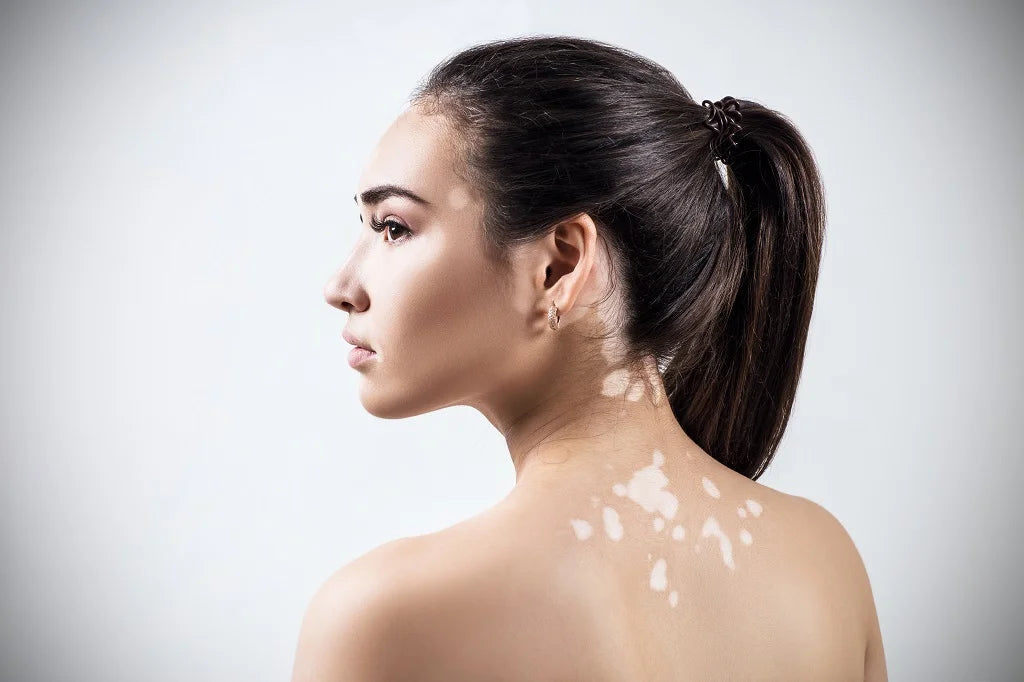What Are White Spots?
White spots are a chronic skin disorder, caused due to loss of skin pigments. The skin gets its characteristic colour from melanin. The melanin producing cells, known as melanocytes can cease to function or die which triggers the occurrence of white spots on the skin. The appearance of white patches is usually observed on the smaller areas of the skin and with time, it spreads to a larger area. These spots can also appear inside the mouth and eyes and the condition is often followed by premature greying of hair. Though the condition is harmless and painless, this skin disease needs to be diagnosed and treated as soon as the first signs show up.
What Are Its Causes?
1. Milia
Milia are keratin-filled cysts that appear like white or yellowish bumps on the skin’s surface. These occur in newborn babies as well as in children and adults. Milia can also develop due to burn, sun damage, or poison ivy. Severe milia can be a result of skin trauma or infection, (like laser treatments, chemical peels, and herpes), or various contributing lifestyle factors, such as smoking, poor personal hygiene and long-term steroid use.
2. Vitiligo
Vitiligo is a skin disorder where white patches of depigmented skin are formed on several parts of the body including the inside of the mouth and nose. Vitiligo symptoms can differ from person to person and can also hereditary. Topical creams, ultraviolet light therapy or oral medication are recommended for vitiligo prevention and its treatment.
3. Pityriasis Alba
Around 5% children around the world, primarily between the ages of 3 and 16 are known to suffer from pityriasis alba. The condition may be associated with a mild form of atopic dermatitis, a type of eczema as it leads to flaky, oval patch of discoloured white skin to appear. These patches are generally scaly and dry. The skin disorder can be triggered by sun exposure or a yeast that causes hypopigmentation.
Also Read : Dermatitis - Types, Causes, Symptoms and Home Remedies
4. Sun Spots
Sun spots are formed when your skin is exposed to extreme UV rays for a long period of time. Also known as idiopathic guttate hypomelanosis, these spots are usually round, flat, white and may vary in size. The risk for sun spots increases with age and the spots can develop on different parts of the body. Using sun protection can prevent sun spots from worsening as well as control the formation of new ones.
5. Pityriasis Versicolor
Pityriasis versicolor is a fungal infection of the skin caused by a yeast. Scaly or dry Pink, white, red or brown patches form when if the yeast goes overactive. Happens mostly to people with oily skin or frail immune system. Spots can be treated by reducing the fungus.
What Are the Major Risk Factors That Cause White Spots?
1. Sunlight
White spots can be triggered by sun damage as the sunrays contain harmful ultraviolet emissions that kills melanocyte cells in the skin. Melanocytes are the melanin-producing neural crest-derived cells that are responsible for skin pigmentation.
2. Heredity
Often the formation of white spots is associated with heredity and family history. Family members share almost the same genes which increases their chances of inheriting the disorder. Like all hereditary issues, it does not happen to the same extent to all members of the family.
3. Type 1 Diabetes
Autoimmune disorders like type 1 diabetes, thyroiditis or the excess presence of free radicals in the body can result in white spots. Many a times white spots are one of the side effects or symptoms of these disorders.
4. Hashimoto's Thyroiditis
Hashimoto's thyroiditis is characterized by inflammation of the thyroid gland. A person suffering from hashimoto's thyroiditis is at a greater risk of developing vitiligo because of vitamin B12 deficiency and hormonal disbalances.
5. Pregnancy Hormonal Disorder
Pregnancy is related to hormonal disorders. This leads to the formation of patches on the skin during that period. However, sometimes they might take time to heal and fade away even after pregnancy due to irregular hormone secretion.
Signs And Symptoms For Vitiligo/White Spots
- Irregular discolouration of the skin.
- Change in the colour of the retina.
- Alteration in the colour of the mucous membranes that line the insides of the mouth and nose.
- Appearance of discoloured spots in the armpits, navel, genitals, and rectum.
How To Treat White Spots Naturally?
How to remove white spots from face? A lot can be achieved using some safe, convenient and effective home remedies. You can use natural ingredients which are safe and inexpensive for white spots on skin treatment.
1. Mustard Oil And Turmeric

Ingredients
- Mustard oil- 250 ml
- Turmeric powder- 5 teaspoons
Method
- Mix both the ingredients together.
- Gently apply it on the affected skin areas and leave it for few hours.
- For further use, store the left-over oil in an airtight container.
Benefits
This remedy might take some time to show appropriate results but both mustard oil and turmeric work wonder for skin problems. The anti-inflammatory and circulation-stimulating nature of these two topical ingredients is sure to make a difference.
How Often To Do
Use this twice a day till you get the desired result.
2. Holy Basil
Ingredients
- Holy basil- few crushed leaves
- Lemon juice- 1 teaspoon
Method
- Mix the crushed leaves with the lemon juice.
- Apply this mixture on the white spots.
- Wash it off with normal water 10 minutes later.
Benefits
Holy basil is antifungal and antiseptic in nature. If directly spread over the affected skin, it might help to get rid of the patches.
How Often To Use
Can be regularly used.
3. Papaya

Ingredients
Fresh papaya- few pieces
Method
- Mash the papaya pieces to form a paste and apply it as a layer on the affected skin.
- You can also rub the papaya pieces directly on the white spots.
- Let it naturally dry for around 10-12 minutes.
- Wash off with cool water.
Benefits
Carotene in Papaya helps to revive the natural pigment of the skin, melanin.
How Often To Do
Apply this once a day.
4. Cabbage
Ingredients
Fresh cabbage leaves
Method
- Blend the cabbage leaves to obtain the juice.
- Use this on the affected parts of your face and body.
- Let it rest for 5-10 minutes so that the skin can react with the cabbage extract.
- Rinse off with water.
Benefits
Cabbage contains amino acid methionine that effectively heals skin ailments. Cabbage juice acts as a cleanser and detoxifying agent.
How Often To Do
Repeat this every day without fail
5. Extracts

Ingredients
- Ginkgo biloba extract supplements
- Method
- Take this twice every day.
Benefits
Gingko biloba is an excellent herb that helps in re-pigmentation of the white spots on your skin with continuous use. Its immune-modulatory and antioxidant properties effectively slow down the growth of the skin disorder.
How Often To Do
Continue this for 2 months.
6. Aloe Vera
Ingredients
Aloe leaf- 1 or aloe vera gel- 2 to 3 tablespoons
Method
- Cut open the leaf and extract the gel present inside it.
- Use this on the white patches and leave it for a couple of hours.
Benefits
Aloe vera is a miraculous healing agent. Its medicinal properties supply nutrients to the skin cells that helps to eradicate white spots, keeping your skin hydrated and moisturised.
Also Read : 10 Amazing Beauty Benefits Of Aloe Vera For Skin
How Often To Do
Apply it 2-3 times every day
7. Vitamins

Ingredients
Vitamin B12 and folic acid supplements
Method
Take as per directed by your physician.
Benefits
Vitamin B12 helps in the improvement of red blood cells, deficiency of which is associated with anaemia and white spots. Intake of proper supplements can restore pigmentation and control the spread of the disorder.
How Often To Do
Continue for a month to see results.
8. Neem
Ingredients
- Neem- a handful of leaves
- Honey- 1 teaspoon
Method
- Blend the leaves to form a paste and mix it with honey.
- Smear the paste on the white spots and let it dry naturally.
- Wash it off after 10-12 minutes.
Benefits
The one-stop solution to treat all your skin problems naturally is in neem. It can help to recover the original colour of your skin.
How Often To Do
Repeat once a day.
9. Green Tea

Ingredients
- Green tea bag- 1
- Hot water- 1 cup
Method
- Brew the green tea and leave it cool down to room temperature.
- Using a cotton ball, apply this on the white patches.
- Let it rest for a few minutes and then rinse with water.
Benefits
Green tea extracts are known to remove white spots from the skin as it is rich in antioxidants. These antioxidants in green tea heal the skin by eliminating the free radicals that damage the skin.
How Often To Do
Repeat this 2-3 times daily.
10. Juicing Recipe
Ingredients
- Lemon- juice of half a lemon
- Cucumber- 1
- Kale leaves- 2 to 3 leaves
- Apple- half
- Celery- 5 stalks
Method
Blend everything together and drink it fresh.
Benefits
Celery contains psoralens that helps the skin react to sunlight in a suitable way, thus reducing the possibility of white spots occurrence in the first place. The rest of the ingredients of the green juice have skin regenerative properties.
How Often To Do
You can drink one or two glasses of this juice every day.
11. Yogurt

Ingredients
Fresh yogurt- 1 cup
Method
Consume yogurt between meals or along with a meal.
Benefits
Lack of vitamin B12 is often a major cause of white spots. Yogurt encourages the growth of vitamin B12 levels in the body which can result in vitiligo prevention.
How Often To Do
Make it a daily habit for healthy skin.
12. Radish Seeds
Ingredients
- Radish seeds- 50 gm
- White vinegar- 50 to 60 ml
Method
- Make a smooth paste by mixing crushed radish seed powder and white vinegar.
- Smear the paste on the affected skin areas.
- Let it rest for 15 minutes and then rinse with water.
Benefits
The healing nature of radish seeds is known to regenerate the formation of melanin in human skin. Thus, will daily use this remedy can provide significant results.
How Often To Do
Repeat this regularly for a period of six months.
13. Red Clay

Ingredients
- Ginger juice- 1 tablespoon
- Red clay- 2 tablespoons
Method
- Blend both the ingredients to form a paste.
- Gently massage the paste on the white spots for a minute or two and leave it on for more 10 minutes.
- Rinse with water.
- Apply a thick moisturizer or coconut oil afterward.
Benefits
Red clay is rich in copper content that can effectively bring back the natural colour of the skin in the white spots formed because of vitiligo. Ginger acts as a good stimulant for blood circulation and also contains antioxidants that promote healthy skin.
How Often To Do
Repeat this once daily for a few months.
14. Sandalwood And Honey
Ingredients
- Sandalwood powder- 1 teaspoon
- Honey- 1 tablespoon
- Turmeric- a pinch
Method
- Blend all the ingredients to form a smooth paste.
- Use this on the white patches.
- Leave it for 10 minutes and rinse with water.
Benefits
Honey can get rid of bacteria and fungus as it is antifungal and antibacterial in nature. When the anti-inflammatory and antioxidant properties of sandalwood are combined with honey, it can be a useful treatment for vitiligo on the face.
How Often To Do
Apply this pack every day.
15. Ginger

Ingredients
Fresh ginger juice
Method
- Apply the ginger juice on the white patches.
- Let it naturally dry for around 20 minutes.
- Rinse off with water.
Benefits
Ginger contains anti-inflammatory properties and is also rich in antioxidants. This helps to improve blood circulation and maintain healthy skin.
How Often To Do
Apply it regularly for the best outcome.
16. Essential Oils
Ingredients
- Frankincense essential oil- few drops
- Carrier oil- 1 tablespoon
Method
- Combine the oils and massage the affected area with this mixture.
- Let the skin naturally absorb the oils.
Benefits
Ayurvedic and Unani medicine often uses the frankincense essential oil to treat various skin disorders like psoriasis, eczema, and vitiligo. It improves the melanin production of the skin and can eventually even out skin discoloration.
Also Read : 8 Most Effective & Natural Treatment for Psoriasis
How Often To Do
Apply this on a daily basis.
17. Coconut Oil Massage

Ingredients
Virgin coconut oil- 4 to 5 tablespoons (more if needed)
Method
- Apply the oil liberally on the affected areas of the skin.
- Gently massage the oil.
- Leave it overnight.
Benefits
Coconut oil has natural antibacterial and antifungal properties. Coconut oil deeply nourishes and moisturizes your skin, improving the blood circulation.
How Often To Do
Use this regularly twice a day (both during the day and night).
18. Copper
Ingredients
- Copper glass or vessel
- Drinking water
Method
- Use a copper vessel to store water overnight at room temperature.
- Drink this water in the morning.
Benefits
Copper is known to possess immune boosting properties. The copper ions get infused into the water when the water is kept in a copper vessel for a long time. This encourages the production of melanin in the body that eventually leads to the restoration of the pigmentation in the white spots.
How Often To Do
Repeat every morning
Tips To Prevent White Spots
- Avoid using too many chemicals on your skin.
- Maintain a healthy skin care routine.
- Do not expose your skin to direct sun rays for a long period of time. Make sure to use a proper sunscreen all the time to protect your skin.
- Steer clear of tanning salons.
- Avoid eating unhealthy junk food. Skin health is dependent on your food and drink habits.
Foods To Eat And Avoid To Get Rid Of White Spots
Foods To Eat
- Cucumber
- Apple
- Mango
- Dates and figs
- Turmeric
- Green tea
- Ginger
- Garlic
- Green leafy vegetables
- Carrots
- Beetroot
- Radish
- Olive oil
- Black pepper
Foods To Avoid
- Papaya
- Grapes
- Milk
- Oily and spicy junk foods
- Fish
- Meat
- Raw tomato
- Raw onion
- Raw garlic
- Brinjal
When To Call A Doctor?
Most of the time, white spots on the body cause no serious health risk, except self-consciousness regarding the appearance. Sometimes due to poor skin care, these spots might refuse to heal and even grow. Consulting a dermatologist is recommended for a better and faster treatment for vitiligo on the face and other affected areas. Also, while white patches are triggered due to lack of pigmentation in the skin, if you see pink patches, the problem might be more serious.
Frequently Asked Questions
1. How To Cover White Spots With Makeup?
- Wash your skin with an antibacterial cleanser and pat dry
- Use a suitable moisturizer.
- Apply a layer of a foundation or concealer that goes with your skin tone on the discoloured skin patch. Blend out the edges using your fingers or any makeup applicator (sponge or brush).
- If required, use more layers of the product but let each layer dry first for around 3-4 minutes.
- Dust any loose translucent or skin-coloured powder to set the area.
2. How To Know If There Is Recovery?
- Take a picture of the affected area in a set lighting.
- Check if the patches have re-pigmented.
- Carefully inspect whether the discolouration has faded away.
- If the skin starts to regain its natural colour, it is a sign of recovery.
3. Do White Spots Pain?
No, the white spots do not pain.
Disclaimer: All the content on anveya.com/blogs is solely for information. It is not intended to be a substitute for professional medical advice, diagnosis or treatment. Always seek the advice of your physician or a qualified health care provider. The information, suggestion or remedies mentioned on this site are provided without warranty of any kind, whether express or implied.



